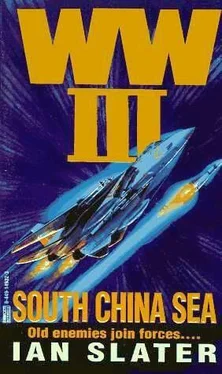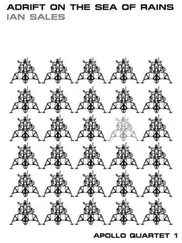An M-60 jammed, its quick-charge barrel glove lost and both machine gunner and assistant killed within seconds. But the HK automatic grenade launcher was proving its worth as Airborne gunners sprayed the breakthrough points with three-to five-round bursts, creating in effect a wall of small-arms artillery, the fragmentation grenades cutting the Chinese down as narrow breakthrough points forced them to cluster at the openings in the wire, running over their dead and dying comrades.
Another artillery duel erupted, the PLA issuing direct fire inside the circle, willing to kill their own as Freeman had done on Disney to gain ground by forcing the enemy back into the network of trenches. Had it not been for the Z turns built in the trenches, there would have been many more American and British casualties. The Z turns, like a traffic island, were plonked into the middle of a trench, where one man could hold off a whole squad. Martinez’s M-60, overheating, jammed, and had it not been for Doolittle cutting down two Chinese with his M-16, Martinez would have been dead. D’Lupo, out of ammunition, threw his rifle at a Chinese soldier, who ducked and bayoneted the American before being chopped to pieces by an M-60 burst at near point-blank range.
“Medic!” Doolittle yelled, firing his last grenade from his M-16 launcher at the wire. A medic was already at D’Lupo’s side, stanching the blood flow and yelling for a stretcher. The next moment the medic was dead from a burst from a Chinese T56-1 RPD, a gaping bloody hole where his chest had been. It seemed like minutes to D’Lupo, but in reality it was only a matter of seconds before a stretcher arrived and he was taken away to a hospital bunker inside the triangle.
* * *
As D’Lupo, hemorrhaging profusely, was being prepped for surgery, a Chinese who miraculously had made it all the way from the outer wire circle into the DEF triangle without a scratch, leapt into the trench, through the curtain — an artillery round shaking the overhead light violently — and began firing. He killed two nurses before the surgeon whipped his scalpel across the man’s throat, immediately returning to his patient while calling for orderlies to take out the dead nurses and telling a whey-faced medic to get a Special Forces type from DEF “down here right now. Tell him to stand outside the prep room.”
“Yes, sir.”
D’Lupo was dead.
Kacey, the Ranger who had run into Salt and Pepper, arrived a minute later with a Winchester 1200 shotgun whose hardened lead slug was guaranteed to stop a train and whose fléchette rounds, or darts — thirty of them — were lethal up to three hundred meters.
“Any fucker jumps down here,” Kacey proclaimed to no one in particular, “his fuckin’ head’ll end up in Laos!”
A man did jump down, but Kacey held his fire. The soldier, one of those who, like Doolittle, had been flown in from Disney, had his right hand missing, was covered in blood, and was staring disbelievingly at something he was carrying in his left hand. It was his other hand, having been sheared off at the wrist.
“Jesus!” Kacey yelled. “Medic — on the double!”
The bugle sounded again, and the Chinese, most of whom had failed to make it more than fifty yards into the circle, began to withdraw. This time the Airborne raked the bodies with machine-gun fire to make sure that no live ones were left waiting for the next attack.
In the two attacks so far, over forty Airborne and two of Berry’s men had been killed, and over 220 PLA “hard hats.” The “hard hats,” or “piss pots,” as the Americans called them, were steel khaki helmets, a sign that Wang was using only strictly professional troops from Chengdu’s Fourteenth Army, that no militia units were being used, that Beijing was determined to win the battle for Dien Bien Phu.
Direct-fire artillery opened up again, and by now even the dimmest soldier on the battlefield could tell what Wang’s tactics consisted of — to shell the hell out of the allied force now under the thousand-man mark, and, once their position in the circle had been pulverized enough, turning dirt to sand, and their heads ringing and nerves stretched to the limit, send in another wave of sappers and storm troopers. The old Chinese water torture method, only instead of a drip at a time, you wore down the enemy by attack after attack. After all, as Wang had told the party chairman himself, the Americans weren’t going anywhere.
And though the Americans’ artillery of six-gun batteries was responding with careful forward-observer-directed fire, it wasn’t effective. Whereas the Americans had dug in within a half-mile-diameter circle whose now treeless moonscape offered an easily seen target for the PLA gunners, the PLA targets, their guns and suspected troop concentrations, were spread all over the hills about Dien Bien Phu. This amounted to a huge ambuscade around the Americans in an area so big that by the time one PLA gun was spotted, it would be retracted, often on wooden rails, deep into the cliffside and on a downgrade. Even if an American 155mm hit a target zone dead on either side of the valley, there would be little if any damage to the Chinese wagon. One or two PLA gunners might die if shrapnel sliced through the camouflaged nets down into the man-made cave or revetment, but there were plenty of PLA soldiers to replace them.
The mist had still not risen by noon, and the joke passed around between enemy salvos’ whistling then thundering in was that Freeman must have been praying again.
In fact, Freeman had now decided to place his faith in what he had briefly referred to as “essential deforestation,” or, as his HQ staff were soon calling it, “clear cutting.” The men in the trenches of Dien Bien Phu called it “fuck the forest.” There was nothing strikingly new about it, as Freeman had seen it used in ‘Nam before, but he did go about the preparations for it with a zest that later appalled Greenpeace and other conservation groups throughout the world. Freeman, avoiding passion, going for reason instead, would tell a hastily convened press conference that “when it comes to preserving the habitat or saving American lives, there is no contest.”
Bob Cline did whisper to him that he should have mentioned the British and other USVUN contingents, but before he could rectify the omission, LaSalle and others were pillorying him for it.
Freeman had told the combat information center aboard Enterprise precisely what he wanted, and when the mists finally rose and disappeared at 1420, the three-component strike force from the carrier was on its way. Entering “flak alley” between the hills of Dien Bien Phu, the first wave, guided in by forward air controllers, dropped fuel air explosive bombs. Unlike napalm, the FAE consisted of dropping a huge blanket of vaporized fuel over the target and detonating it all at one instant. This burnt much of the vegetation off in one enormous blanket of intense fire, consuming any troops directly beneath it.
The second wave of fighter-bombers then streaked in, dropping five-hundred-pound Snakeye bombs, which denuded the target area of any trees still standing. The third wave then swept in and, with the hillside devoid of vegetation, looking from the air like huge patches of mange, the fighter-bombers dropped laser-guided and high-angled two-thousand-pound bombs directly into the gaping holes that were, or rather had been, the revetments for the Chinese guns. This, as Leigh-Hastings put it, “upset” the Chinese gunners inside, and made a mess of their guns as well, which the USVUN forces in the circle and DEF triangle greatly appreciated.
There was a problem, however, and to his credit, Freeman, playing devil’s advocate to his own strategy, realized it before anyone else at Dien Bien Phu. The problem was that this awesome attack upon the hillsides meant that if Wang was not to lose any more men in such clear-weather attacks, it had either better rain or Wang had to speed up his artillery and massed-attacks combination tactic to overwhelm the Dien Bien Phu garrison before the “gangster arsonist,” Freeman, burnt him out — driving him out of the hills.
Читать дальше












